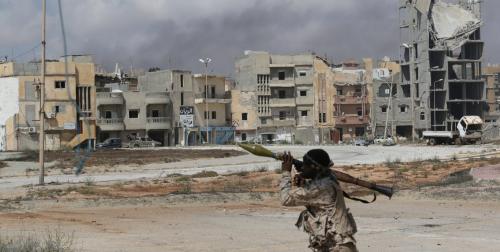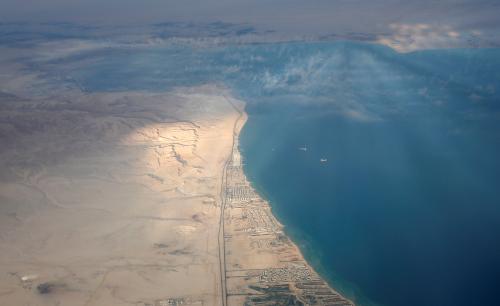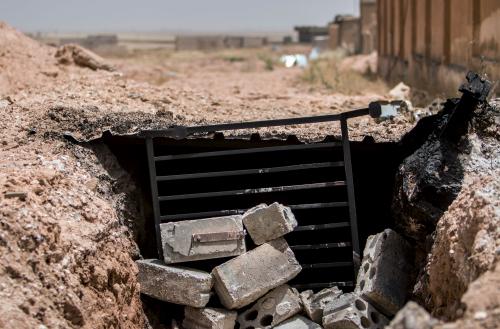ISIS poses a major threat to the Middle East and to U.S. interests in the region, writes Dan Byman. That threat can be divided into three categories—conquest, expansion, and agitation—all of which have profound implications for U.S. policy. This post originally appeared on Lawfare.
Politicians and analysts in Europe and the United States understandably focus on the threat the Islamic State poses to the West, and the debate is fierce over whether the group’s recent attacks are a desperate gasp of a declining organization or proof of its growing menace. Such a focus, however, obscures the far greater threat the Islamic State poses to the Middle East and U.S. interests in the region. This threat can be divided into three categories—conquest, expansion, and agitation—all of which have profound implications for U.S. policy and should shape the U.S. role in the Middle East even if terrorism in the West declines.
The Islamic State has long sought to increase its power by consolidating and expanding its quasi-state in Syria and Iraq. At its height in 2014, large parts of Iraq and Syria were under the group’s control. The Islamic State conquered territory directly through conventional military operations and used guerrilla war and terrorism to weaken enemy government and civilian morale and stretch their forces. Much of the Islamic State’s day-to-day terrorism is linked to its war effort, with enemies like Iraq’s Shiite population bearing the brunt of many of the group’s attacks. The U.S.-led coalition and their local allies have reversed the Islamic State’s military expansion, shrinking the territory under its control. In so doing, they have caused massive financial problems for the group, decreased the number of foreign fighters, and weakened its appeal in general.
The Islamic State has sought to expand into “provinces” throughout the Muslim world, following al-Qaida’s use of “affiliates” in the past. This expansion spreads the risk of civil wars to new areas and increases the ferocity of existing ones. Moreover, the Islamic State governance system makes life even more miserable for already suffering communities. Some of these provinces drew on small terrorist groups that used the Islamic State brand to expand. Others, such as Boko Haram in Nigeria, were powerful groups already. In some instances, local commanders broke off from an al-Qaida affiliate, using the IS name as a pretext for a power grab. In October, the Islamic State’s Sinai province downed a Russian passenger jet flying from Egypt, killing all 224 people. The Islamic State’s province in Libya carved out territory near the city of Sirte, though recent military efforts by militias tied to the Libyan “government” have pushed the group back considerably.
The Islamic State exerts tremendous influence even outside areas where it controls territory, agitating regional politics in general.
The Islamic State exerts tremendous influence even outside areas where it controls territory, agitating regional politics in general. Its terrorist attacks in nearby Lebanon, Turkey, and Saudi Arabia are revenge for the policies of enemy governments (or the powerful sub-state group, Lebanese Hezbollah, which is an important ally of the Assad regime). In addition, they are attempts to foment sectarianism and otherwise shape regional politics to reflect the Islamic State’s worldview and strategy. The Islamic State’s high-profile violence also inspires extremist voices, creates fears of instability, and injects divisive issues such as sectarianism into a region already highly divided. This agitation increases the risk of civil wars and political violence and degrades politics in general.
The Islamic State’s persistence in the Middle East also keeps the risk of terrorism to the West high. The success of U.S. and allied forces in the past year have not stopped the Islamic State from using its territory—and perhaps, in the future, that of its “provinces”—to organize terrorist attacks outside the region, such as the November 2015 Paris attacks. Indeed, as the Islamic State’s territory shrinks, it has more incentives to do low-cost, high-profile terrorist attacks against its enemies outside the region.
The Islamic State’s role in the Middle East has several implications for the United States beyond the threat of terrorism against the United States and its Western allies. The strife and risk of greater chaos create a constant demand for intervention in ways both large and small. To prevent the Islamic State from expanding (and to shrink its territory), a significant USAF campaign along with efforts to train local forces is necessary. More forces are necessary to make more dramatic gains. To a lesser degree, military assistance and limited direct military strikes are necessary against Islamic State efforts to expand through its provinces.
The violence the Islamic State produces also creates refugee flows and a broader humanitarian crisis. Though refugee flows have hit regional states the hardest, the crisis has become an international one, with significant consequences for European states and U.S. allies. Most refugees fleeing Syria are fleeing the Assad regime’s abuses and hardship in general, but thousands have also left areas under Islamic State control. In addition to refugee flows, abhorrent practices such as sexual slavery and the slaughter of Muslim minorities create grave humanitarian concerns. The Islamic State also targets international aid organizations, limiting social services in the hardest-hit areas.
Finally, the Islamic State is a dictator’s dream “bogeyman” when interacting with the West. Regional dictators use the genuine risks the Islamic State poses as a pretext for delaying or reversing democratic reform, cracking down on opponents, and otherwise playing off U.S. security interests against broader U.S. concerns over democratization and good governance.
So, even if the terrorism danger to the West diminishes, the United States and its allies must recognize that the Islamic State will, and should, profoundly shape their foreign policies towards the Middle East.
The Brookings Institution is committed to quality, independence, and impact.
We are supported by a diverse array of funders. In line with our values and policies, each Brookings publication represents the sole views of its author(s).








Commentary
The Islamic State threat to the Middle East
August 1, 2016